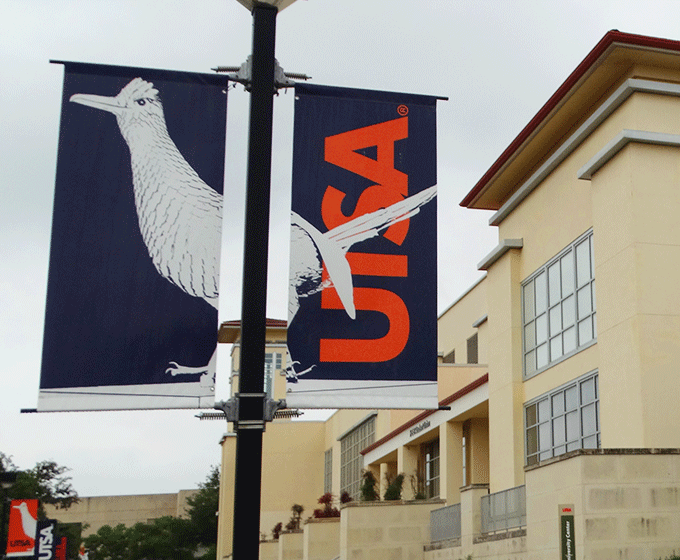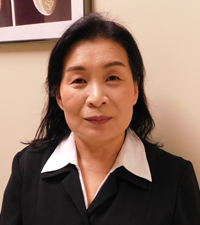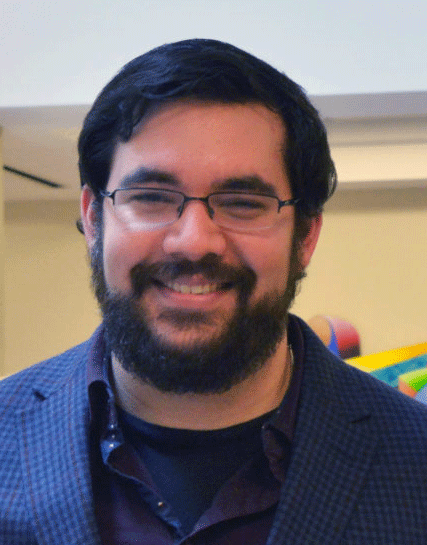
JULY 12, 2023 — The National Academy of Inventors (NAI) has named 95 academic inventors to its 2023 class of senior members, including UTSA faculty members Robert Lyle Hood (mechanical engineering), Chiung-Yu Hung (molecular microbiology and immunology) and Jose Lopez-Ribot (molecular microbiology and immunology).
NAI senior members are active faculty members, scientists and administrators from NAI member institutions who have demonstrated remarkable innovation producing technologies that have brought or aspire to bring real impact on the welfare of society.
With the recent election of the class of 2023, UTSA now has 10 senior members and seven fellows in the NAI. They also have growing success in patents, licensing and commercialization.

Hung is an associate professor in the UTSA College of Sciences. With nearly 70 peer-reviewed publications, she is an expert in the field of Coccidioides, also known as San Joaquin Valley fever, an infectious fungal disease that affects the respiratory system. Focused on the development of therapeutics, diagnostics and vaccines against Coccidioides infections, she is developing a human vaccine with recent funding from the National Institutes of Health.
Using a five-year, $6.8 million NIH grant, Hung established the San Antonio-based Coccidioidomycosis Collaborative Research Center (SA-CCRC) to develop therapeutics and vaccines against valley fever. Hung is also co-director of the Vaccine Development Center at San Antonio and an executive committee member of the South Texas Center for Emerging Infectious Diseases, based at UTSA. Last year, the UTSA Office of Commercialization and Innovation named Hung as its Innovator of the Year during its 10th annual Innovation Awards.

Hood is an assistant professor in UTSA’s Margie and Bill Klesse College of Engineering and Integrated Design. With a focus on medical device design and development, his areas of expertise include laser-tissue interaction, drug delivery systems and biomedical optics.
His research has been funded by the National Institutes of Health, the Wallace H. Coulter Foundation, the U.S. Department of Defense and the National Science Foundation. Hood has authored more than 40 peer-reviewed articles on medical device development, which have appeared in such notable publications as Lasers in Surgery and Medicine, and the Journal of Biomedical Nanotechnology.
Hood also oversees UTSA’s Medical Design Innovations (MDI) Laboratory, whose primary mission is to further medical science and improve patient outcomes through innovative device designs. Working with graduate and undergraduate researchers, the MDI Lab is working on a variety of innovative projects. These include a special suction tool to help clear fluid and debris waste in combat and medical emergencies, a fiber optic microneedle that enhances drug delivery methods and a system that helps preserve severed limbs by preventing tissue degradation and facilitating reattachment surgery.

Lopez-Ribot is a professor and associate dean for research in the College of Sciences. He’s also a Margaret Batts Tobin Distinguished Chair in Biotechnology. His areas of specialization include antifungal drug development, medical mycology and microbial biofilms.
Lopez-Ribot's research provides important insights into the pathogenesis of candidiasis, the main fungal infection affecting an increasing number of immune- and medically compromised patients. His work helps devise new strategies for the diagnosis, prevention and treatment of candidiasis.
In addition, Lopez-Ribot's lab offers the opportunity for UTSA students to be trained in a variety of state-of-the-art techniques related to fungal pathogenesis and antifungal drug development. Working with Hung, Lopez-Ribot is the co-PI of the $6.8 million NIH grant awarded last year to establish the SA-CCRC to help develop therapeutics and vaccines against coccidioidomycosis.
“UTSA is an urban serving university where research and discovery spurs economic development and improves the quality of life for Texans,” said JoAnn Browning, UTSA interim vice president for Research, Economic Development and Knowledge Enterprise. “Robert Hood, Chiung-Yu Hung and Jose Lopez-Ribot are exemplars of the innovation, collaboration and entrepreneurial spirit that drives discovery at UTSA. Their induction into the National Academy of Inventors is well deserved.”
Nomination for NAI senior member by an individual’s supporting institution is a distinct honor and a significant way for an institution to publicly recognize innovative leaders on a national level.
The Tampa, Florida based NAI has some 4,600 members from universities, governmental agencies, and nonprofit research institutes. The organization recognizes and encourages inventors with U.S. patents, enhances the visibility of academic technology and innovation, encourages the disclosure of intellectual property, and educates and mentors students.
The 2023 NAI class is its largest to date. Representing 50 NAI member institutions and research universities across the nation, these new inductees are named inventors on over 1,200 issued U.S. patents.
UTSA Today is produced by University Communications and Marketing, the official news source of The University of Texas at San Antonio. Send your feedback to news@utsa.edu. Keep up-to-date on UTSA news by visiting UTSA Today. Connect with UTSA online at Facebook, Twitter, Youtube and Instagram.
Move-in Day is an exciting time for incoming students. Students living in Alvarez Hall (2nd and 4th), and Chisholm Hall are moving in on August 19. The UTSA Housing and Residence Life (HRL) team looks forward to welcoming you all and helping you settle into your room.
Alvarez Hall and Chisholm HallMove-in Day is an exciting time for incoming students. Students living in Chaparral Village move in from August 20-21. The UTSA Housing and Residence Life (HRL) team looks forward to welcoming you all and helping you settle into your room.
Chaparral VillageMove-in Day is an exciting time for incoming students. Students living in Laurel Village move in on August 22. The UTSA Housing and Residence Life (HRL) team looks forward to welcoming you all and helping you settle into your room.
Laurel VillageThe College of Sciences welcomes our newest Roadrunners to UTSA at VIVA Science! This interactive event connects students with faculty, staff, student leaders, and peers while highlighting the opportunities available across the College.
Outdoor Learning Environment 2 (OLE), Flawn Building, Main CampusWe're excited to welcome the new class of UTSA College of Liberal and Fine Arts (COLFA) students to campus! Move In To COLFA is strongly recommended for new students in COLFA because it gives you the chance to learn about the Student Success Center, learn how to do college successfully and meet new friends.
Galleria (MH 2.01), McKinney Humanities Building, Main CampusBuild connections with your Alvarez College of Business peers and learn more about the Career Compass program! This opportunity will provide fun interactions, giveaways and a chance to meet your next friend!
Richard Liu Auditorium (BB 2.01.02,) Business Building, Main CampusCelebrate the end of summer and the start off a great fall semester with The Housing Block Party! This event will have live music, carnival-style treats, artists, games, and activities galore. Come and join us for a night of fun!
Multipurpose Room/Lawn, Guadalupe Hall, Main CampusThe University of Texas at San Antonio is dedicated to the advancement of knowledge through research and discovery, teaching and learning, community engagement and public service. As an institution of access and excellence, UTSA embraces multicultural traditions and serves as a center for intellectual and creative resources as well as a catalyst for socioeconomic development and the commercialization of intellectual property - for Texas, the nation and the world.
To be a premier public research university, providing access to educational excellence and preparing citizen leaders for the global environment.
We encourage an environment of dialogue and discovery, where integrity, excellence, respect, collaboration and innovation are fostered.